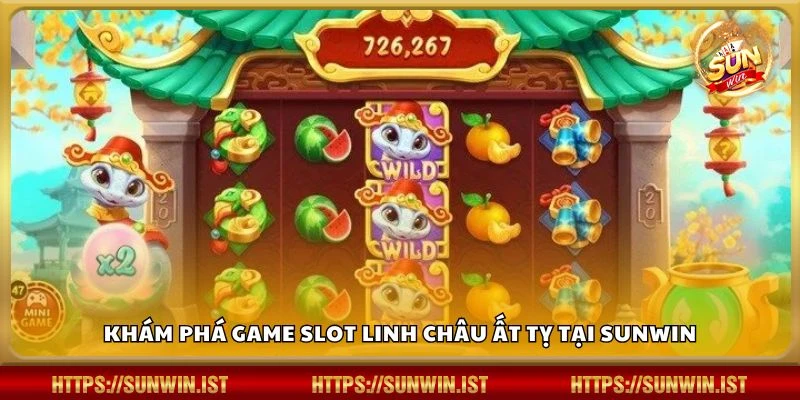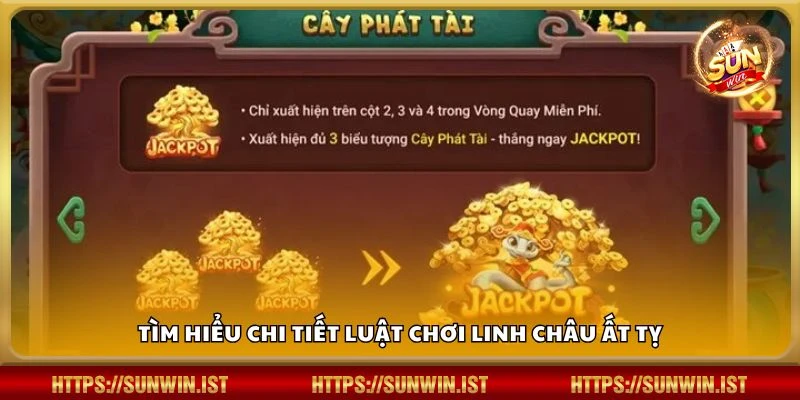Linh Châu Ất Tỵ Sunwin là tựa slot game lấy cảm hứng từ văn hóa phương Đông huyền bí, nơi hội tụ hình ảnh rồng linh thiêng, ngọc báu và các biểu tượng phong thủy. Thiết kế bắt mắt và lối chơi cuốn hút, trò chơi mang đến cảm giác như lạc vào thế giới kỳ ảo đầy sắc màu Á Đông. Bài viết này sẽ giúp bạn khám phá trọn vẹn sức hấp dẫn của trò chơi tại https://sunwin.ist/.
Giới thiệu trò chơi slot Linh Châu Ất Tỵ Sunwin

Trò chơi lấy cảm hứng từ năm Ất Tỵ trong vòng 12 con giáp, đại diện cho rắn – biểu tượng của sự thông thái và may mắn trong văn hóa phương Đông. Thiết kế giao diện tái hiện hình ảnh rắn vàng uốn lượn, chùa cổ và hoa sen, tạo cảm giác huyền bí. Màu sắc chủ đạo là vàng, đỏ và xanh lá, tượng trưng cho sự thịnh vượng và hòa hợp.
Giao diện Linh Châu Ất Tỵ được Sunwin xây dựng với đồ họa 3D sắc nét, mang đến trải nghiệm sống động như đang tham gia lễ hội truyền thống. Hiệu ứng ánh sáng và chuyển động của các biểu tượng rắn, ngọc và tiền vàng tạo sự cuốn hút. Âm thanh lấy cảm hứng từ nhạc cụ phương Đông như sáo và trống, kết hợp với tiếng chuông chùa, tăng thêm phần thiêng liêng.
Linh Châu Ất Tỵ cung cấp hệ thống jackpot với các cấp độ như Mini, Minor, Major và Grand, mang lại cơ hội nhận thưởng lớn. Giá trị jackpot hiển thị trực tiếp trên màn hình, tăng dần theo thời gian thực. Người chơi có thể kích hoạt jackpot qua các vòng quay may mắn hoặc biểu tượng đặc biệt. Tính năng này được thiết kế minh bạch, giúp người chơi dễ dàng theo dõi và tham gia.
Tìm hiểu các biểu tượng đặc biệt trong Linh Châu Ất Tỵ

Các biểu tượng trong Linh Châu Ất Tỵ Sunwin không chỉ mang ý nghĩa văn hóa mà còn đóng vai trò quan trọng trong việc tạo ra phần thưởng, giúp người chơi tối ưu hóa cơ hội chiến thắng.
Biểu tượng Wild – Rắn vàng
Biểu tượng Wild là hình ảnh rắn vàng, có khả năng thay thế tất cả các biểu tượng khác (trừ Scatter và Bonus) để tạo thành tổ hợp thắng. Khi xuất hiện 5 Wild trên một hàng, người chơi nhận được phần thưởng cao nhất, lên đến 150 lần cược. Hiệu ứng rắn uốn lượn khi kích hoạt Wild tạo cảm giác phấn khích. Biểu tượng này thường xuất hiện trên cuộn giữa để tăng cơ hội thắng.
Biểu tượng Scatter – Ngọc châu
Biểu tượng Scatter trong Linh Châu Ất Tỵ là viên ngọc châu, kích hoạt vòng quay miễn phí khi xuất hiện từ 3 lần trở lên trên màn hình. Mỗi lần kích hoạt mang lại 10 vòng quay miễn phí, với cơ hội nhân thưởng lên gấp đôi. Số lượng Scatter càng nhiều, phần thưởng càng tăng, tối đa lên đến 15 vòng quay.
Biểu tượng Bonus – Hộp ngọc
Biểu tượng Bonus là hình ảnh hộp ngọc, xuất hiện trên cuộn 2, 3 và 4 để mở khóa mini-game hoặc vòng jackpot. Khi thu thập đủ 3 Bonus, người chơi được đưa vào vòng chọn ô ẩn để nhận thưởng ngẫu nhiên. Giá trị thưởng có thể dao động từ vài chục đến hàng nghìn lần cược, tùy thuộc vào may mắn.
Biểu tượng thông thường
Các biểu tượng thông thường trong Linh Châu Ất Tỵ bao gồm hoa sen, tiền vàng, trái cây và rồng nhỏ, mang lại phần thưởng cơ bản khi xuất hiện từ 3 đến 5 lần trên một hàng. Giá trị thưởng dao động từ 2 đến 80 lần cược, tùy theo số lượng và loại biểu tượng. Hình ảnh được thiết kế tinh xảo, phản ánh nét văn hóa phương Đông, giúp trò chơi thêm phần hấp dẫn.
Jackpot hiển thị trên giao diện
Jackpot được hiển thị trực tiếp với các cấp độ Mini, Minor, Major và Grand, tương ứng với giá trị thưởng khác nhau. Biểu tượng jackpot xuất hiện ngẫu nhiên trong các vòng quay may mắn, mang lại cơ hội trúng lớn. Người chơi cần theo dõi kỹ để nắm bắt thời điểm kích hoạt, tăng cơ hội nhận thưởng cao nhất.
Hướng dẫn chi tiết luật chơi Linh Châu Ất Tỵ

Hiểu rõ luật chơi Linh Châu Ất Tỵ giúp người chơi nhanh chóng làm quen và tận dụng tối đa các cơ hội trong trò chơi.
Cách đặt cược và bắt đầu ván chơi
Người chơi bắt đầu bằng cách chọn mức cược từ vài nghìn đến hàng trăm nghìn đồng mỗi lượt trong giao diện Sunwin. Nhấn nút “Quay” để bắt đầu hoặc sử dụng chế độ tự động với số lần quay tùy chọn. Màn hình 5×3 với 20 đường trả thưởng cố định sẽ hiển thị kết quả sau vài giây.
Quy tắc tạo tổ hợp thắng
Tổ hợp thắng trong Linh Châu Ất Tỵ được tính khi có ít nhất 3 biểu tượng giống nhau xuất hiện trên một đường trả thưởng, bắt đầu từ cuộn trái sang phải. Biểu tượng Wild thay thế để hoàn thiện tổ hợp, trong khi Scatter và Bonus kích hoạt các tính năng đặc biệt. Số tiền thưởng tự động cộng vào tài khoản sau mỗi lượt thắng. Người chơi cần kiểm tra bảng thanh toán để nắm rõ giá trị.
Vòng quay miễn phí và mini-game
Khi xuất hiện 3 Scatter, người chơi nhận 10 vòng quay miễn phí, với mọi phần thưởng được nhân đôi. Mini-game được kích hoạt bởi 3 biểu tượng Bonus, cho phép chọn các ô ẩn để nhận thưởng hoặc jackpot. Mỗi vòng có thời gian giới hạn, yêu cầu người chơi quyết định nhanh chóng. Các tính năng này tăng thêm sự hấp dẫn và cơ hội nhận thưởng lớn.
Kết luận
Linh Châu Ất Tỵ Sunwin mang đến trải nghiệm vừa giải trí, vừa gợi mở nét văn hóa phương Đông đặc sắc. Mỗi vòng quay là một hành trình tìm kiếm vận may ẩn sau những biểu tượng linh thiêng. Bên cạnh đó, bạn cũng có thể khám phá thêm Mèo Tài Lộc – slot game mang biểu tượng may mắn và tài lộc, hứa hẹn sẽ mang đến những phần thưởng bất ngờ.
